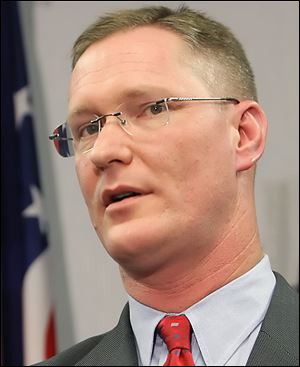
6 Ohio congressmen sleep in their D.C. offices
6/20/2011
U.S. Rep. Steve Stivers
WASHINGTON - Forget voting schedules or committee schedules. Rep. Steve Stivers has the real schedule of the U.S. House of Representatives down to a science.
The gym opens at 5:30 a.m. The cafeteria opens at 7:30 a.m.
The Columbus Republican should have the schedule memorized - he is one of at least six members of Ohio's U.S. House delegation who sleep in their offices when they're in Washington.
A quick poll of Ohio House members finds that at least a third of Ohio's House delegation - Reps. Steve Chabot, R-Cincinnati, Jim Jordan, R-Urbana, Bob Latta, R-Bowling Green, Bill Johnson, R-Marietta, Steve Austria, R-Beavercreek and Stivers - stay in their offices during the week. Two of those members- Stivers and Austria - might be there only temporarily, according to their offices.
"Congressman Austria rented an apartment in D.C. for 2 1/2 years, and recently moved out in May because the rent was raised," spokeswoman Stephanie Sonksen said. "He is temporarily staying at his office and at his sister's home while searching for a permanent place."
Part of it is the cost. Rent for a Capitol Hill apartment typically begins at $1,000 a month, and that's often for a studio.
Part of it is practicality: "He works long hours and this is more time-efficient," said Izzy Santa, a spokeswoman for Latta.
And part of it is culture: Congress itself is more transient than it was years ago. Just a few decades ago, members of Congress moved their entire families to town when Congress was in session, spending half of the year in D.C. and the other half in their districts, said Donald Ritchie, the Senate historian. But by the late 1950s jets made it easier for members to fly home to their districts.
By the 1980s, most congressional families opted to stay at home when Congress was in session, and Congress had begun scheduling votes Tuesdays through Thursdays to enable members to fly home for long weekends.
When Newt Gingrich became the speaker of the House in 1995, he gave the practice of sleeping in the office his blessing, saying he didn't want to "micromanage" the lives of members.
"There was a time when Congress was here fairly steadily for six months of the year, which meant working sometimes on Saturday mornings," Ritchie said. "Members golfed together; their kids went to dancing classes; there was a lot more socializing."
Ritchie said the shift in schedules has meant "much less opportunity to meet people outside of your party or state delegation." And the change likely has contributed to less bipartisanship, he added.
Johnson, who, like Stivers, is a freshman, said it's not so much cultural as practical.
His eastern Ohio district is a 6 1/2-hour drive from the northern to the southern end. The only way he can adequately represent his district, he said, is to be there as much as possible.
One recent weekend, he spent 3 1/2 hours driving to the northern tip of the district. He had a few hours' worth of meetings and then drove the 3 1/2 hours back.
"I spend as little time in Washington, D.C., as I can," he said. "I didn't get elected to move to Washington; I got elected to serve in Washington. I've got a lot of people to listen to, and four out of seven days a week, I'm doing that."
He said that because he sleeps in his office, he works more efficiently. He wakes at 5:30 or 6, goes to the gym and showers, and is at his desk and ready to work by 7:30.
His day typically ends at 8 or 9 p.m., he said. Then he spends a few hours reading briefing materials and goes to sleep about 11 p.m. or midnight.
Sleeping in his office, he said, "is the most practical way to serve the people who represent me."
READ MORE of this article at dispatch.com.